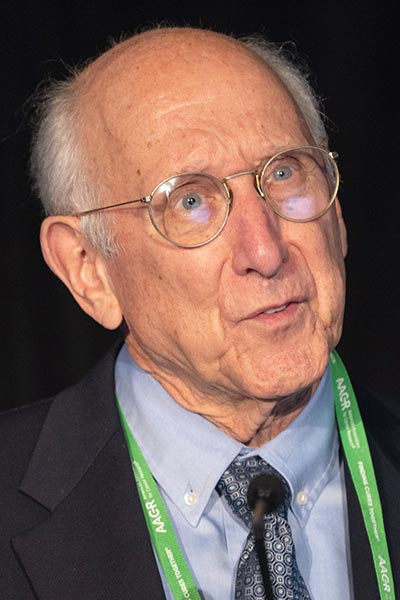Pezcoller Award lecturer recounts historic advances in cancer immunotherapy
From the earliest efforts to develop human cancer immunotherapy more than 40 years ago to the approval of CAR-T cell therapy as the first “living drug” to treat cancer in 2017, Steven A. Rosenberg, MD, PhD, FAACR, has played an outsized role in several discoveries that have advanced treatments for patients with cancers.

Rosenberg recounted the “long and winding road” from the earliest breakthroughs in cellular immunology to approved cancer immunotherapies when he delivered the Pezcoller Foundation-AACR International Award for Extraordinary Achievement in Cancer Research Lecture on Sunday, April 10, at the Annual Meeting. The session can be viewed on the virtual platform by registered meeting participants through July 13, 2022.
Among his many accomplishments, Rosenberg was the first to introduce a foreign gene into a human and to successfully utilize T-cell receptors against solid epithelial cancers and chimeric antigen receptors (CAR) against lymphomas.
His interest in immunology began when, as a young surgical resident, he encountered a patient who had developed metastatic kidney cancer after receiving a transplant kidney that contained a renal cancer.
“The patient was on immunosuppressive drugs to keep the kidney from rejecting, and when those immunosuppressive drugs were withdrawn the kidney was rejected, but all of the metastatic cancer was also rejected and disappeared,” said Rosenberg, head of the Tumor Immunology Section at the National Cancer Institute. “And that indicated that even large, bulky vascularized cancers could be rejected by an immune reaction if that immune reaction was strong enough.”
A subsequent encounter with a patient diagnosed with metastatic gastric cancer provided yet another indication that the body had the ability to detect a cancer as foreign. That patient underwent complete regression in the absence of any treatment.
“Seeing that spontaneous regression, I took blood from that patient and transfused it into a different patient who was at the hospital who had a gastric cancer and the same blood type. Of course, it had no impact, but it planted a seed for me that perhaps there was something in patients that could be transferred that could be effective cancer therapy,” Rosenberg recalled. “I went on to study interleukin-2 (IL-2), which gave us the opportunity to manipulate lymphocytes outside the body and keep them alive for the first time.”
In 1985, Rosenberg’s lab described the use of IL-2 to treat cancer, and in 1988 published for the first time that one could transfer immune lymphocytes to a patient and see tumor regression.
“That led to many clinical trials and the FDA finally approved IL-2 in 1992 for renal cell cancer, and for melanoma in 1998,” Rosenberg said. “The first patient that responded to IL-2 therapy had widespread metastatic melanoma, underwent a complete regression, and she remains alive now over 30 years later.”
Rosenberg subsequently worked on CARs, identifying somatic mutations as targets of T-cell immunotherapy, and demonstrated that administration of tumor-infiltrating lymphocytes along with an IL-2 and a lymphodepleting preparative regimen stimulates complete remission in metastatic melanoma and selected other cancers.
“T cells that recognize unique somatic mutations can be found in tumor-infiltrating lymphocytes and peripheral blood lymphocytes in patients with common epithelial cancers,” Rosenberg said. “Identification and targeting of mutations unique to each cancer, or shared mutations such as KRAS or p53, has the potential to extend cell therapy to patients with common epithelial cancers using either naturally occurring or TCR (T cell receptor) transduced cells.”
More from the AACR Annual Meeting 2025
View a photo gallery of scenes from Chicago, continue the conversation on social media using the hashtag #AACR25, and read more coverage in AACR Annual Meeting News.

